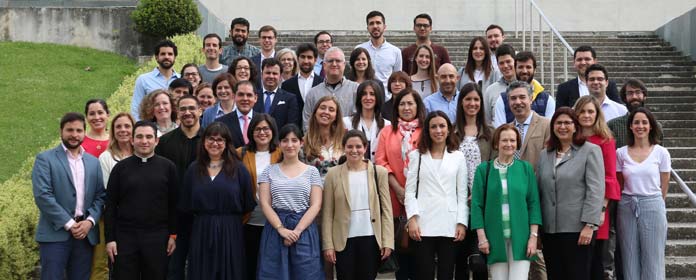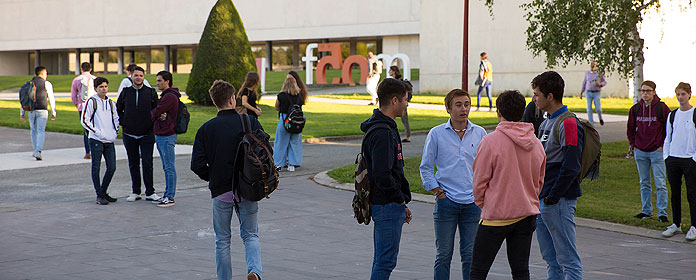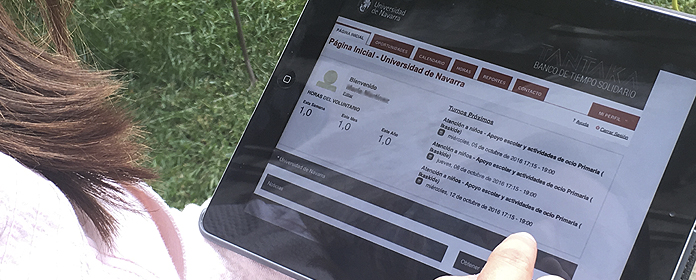Fifty PhD students from the Humanities, Social Sciences and ICS present their research during an interdisciplinary forum
This year marks the first edition of a forum to present, discuss and communicate research results in front of an interdisciplinary audience

FOTO: Elena Beltrán
A PhD requires hours and hours of reading in the library, conversations with one’s thesis director, and sleepless nights developing an idea. The foundation for a researcher’s career is set during this stage, which is why it is important that he learn to develop all the skills that he will be called upon to use in the future.
One of them is the ability to present, discuss and communicate research results in front of an interdisciplinary audience. To this end, the Institute for Culture and Society (ICS) of the University of Navarra organized its first forum on Interdisciplinary Research for PhD students from the Humanities, Social Sciences and ICS.
According to the ICS’s Academic Coordination unit, which was responsible for the forum’s organization, leading research increasingly requires using several discourses and developing a mentality and habits that facilitate interdisciplinary work. In addition to cultivating one's discipline and becoming aware of its limits, it is important to develop the intellectual and moral capabilities necessary for establishing fruitful dialogue with colleagues from other disciplines.
A variety of doctoral programsIn total, 40 speakers and 15 assistants from various doctoral programs participated, including from the humanities, arts and philosophy (School of Humanities and Social Sciences), philosophy (Ecclesiastical School of Philosophy), nursing sciences (School of Nursing), communication and applied creativity (School of Communication), law and global society law, economic development, risk and social integration (School of Law), education and psychology (School of Education and Psychology), government and organizational culture (Business and Humanism Institute), history and critical analysis of twentieth-century Spanish architecture (School of Architecture), and applied medicine and biomedicine (School of Sciences).
The topics presented include the following: “A discursive approach to post-crisis social inequality: From representation to exclusion,” “Does Big Data apply in public relations?” “Alcohol consumption in adolescence,” “Interdisciplinarity as a personal and professional attitude,” “The meaning of the professional practice environment in the relationship model between the nurse and the patient/family: Getting to know nurses’ experiences” and “Visual communication of climate change in social networks: The role and influence of online video,” among others.
Gustavo Garduño, from the School of Law, especially highlighted the interdisciplinarity of the event and appreciates the opportunity to get to know what other PhD students are working on at the University. "I would like all of us to present our projects," he asserted. He presented his project on the national margin of appreciation, a tool that was initiated in Europe and that some seek to apply to the Inter-American Human Rights System.
Katya Palafox, from the School of Education and Psychology, offered a presentation on social development, empowerment of women and promotion of motherhood. This experience has given her knowledge of "different points of view and of different areas" and has helped her to "systematize her thoughts when it comes to communicating research."
Berta Viteri, of the ICS, considered the forum a "great initiative" for "discovering other doctoral students’ research, and for establishing new synergies." During the forum, she spoke about her thesis, which deals with the role of women in American democracy in the context of Alexis de Tocqueville's work.
"Normally," she acknowledges, "doctoral students are scattered throughout campus and are not aware of the research that others are developing. Sometimes there are connections between our topics and we do not even know it."
PhD of the University of NavarraSchool of Architecture
Beatriz de la Puerta Gancedo
Francisco Xabier Goñi Castañón
Mariano Salazar Ruiz
Miguel Ángel Valdés González
School of Communication
María Fernanda Novoa Jaso
Tatiana Pereira Villazón
Leonor Solís Rojas
School of Law
Maria Eugenia Baldessari
Roberto Cruz Palmera
Gustavo Garduño Domínguez
Julio Pohl
Ecclesiastical School of Philosophy
Juan Gabriel Alfaro Molina
School of Education and Psychology
Leire Gambra Echeverría
Fátima Ruiz Fuster
Katya Palafox Gómez
School of Nursing:
Cristina Alfaro Díaz
María Isabel Armendáriz Azcárate
Miriam Pereira Sánchez
School of Humanities and Social Sciences:
Alfonso Aparicio Basauri
María Paz Azparren Legarre
Marta Castillo
Gloria del Carmen Balderas Rosas
Francisco Durán Vian
María Antonia Frías Sagardoy
Selene Jiménez Segura
María Luisa Lecaros Monge
Susana Madinabeitia Manso
Santiago de Navascués Martínez
Juan Pablo Rodríguez Méndez
José María Sánchez Galera
Adrián Suárez Martínez
Elkin Darío Toloza Villalobos
Carlos Veci Lavín
Institute for Culture and Society:
Pedro Antonio de la Rosa Fernández-Pacheco
Adriana Gordejuela Senosiáin
Saqlain Hassan
Berta Viteri Ramírez
Business and Humanisme Institute
Jose E. Arizón Fanlo
Víctor Alejandro Meléndez García
Linda Paz Quezada



